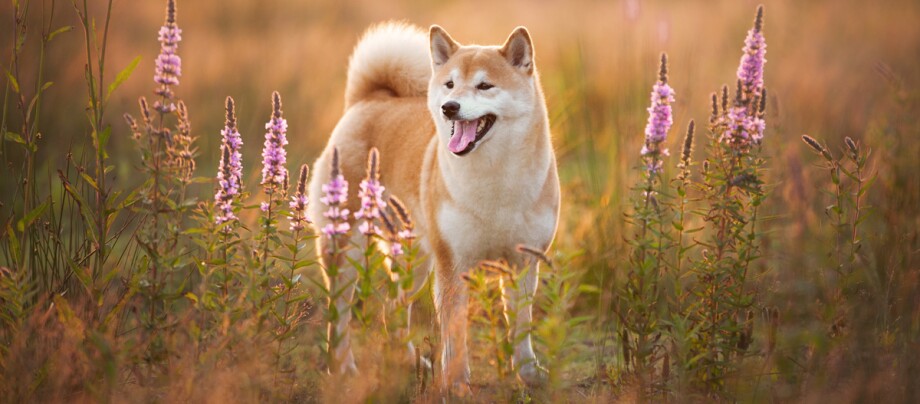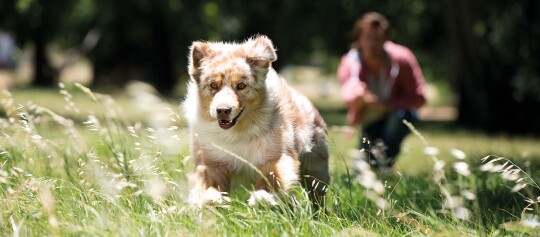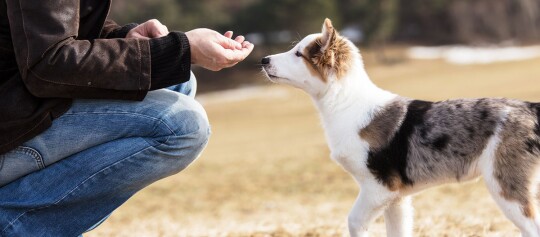Shiba Inu: Japanese spitz with a sharp mind
22.02.2024 - Reading time: 8 minutes

Despite strong competition from small European breeds, the Shiba Inu remains one of the most popular breeds in its native Japan. This is for good reason: Shiba Inus are highly loyal and devoted to their chosen humans and fascinate with their intelligence and pleasant nature. This Japanese pooch has also found its place as a family dog in regions outside of Asia, particularly in North America and Europe. Did you know: Shiba Inu means “small dog” in English.
- The history of the Shiba Inu
- Why a Shiba Inu? Character and temperament of the Shiba Inu
- Profile
- Does a Shiba Inu make a good family pet?
- Training and looking after a Shiba Inu
- How much space does a Shiba Inu need?
- Care and nutrition of the Shiba Inu
- How much does a Shiba Inu cost?
- Buying a Shiba Inu - what to watch out for
- Special features of the Shiba Inu
The history of the Shiba Inu
The Shiba Inu has its origins in the mountainous regions of Japan where dogs were kept for hunting birds and small game. The breed has been systematically bred only since 1928. Before this time, purebred Shina Inus almost disappeared due to crossbreeding with British hunting dogs. The breed was recognised as a “National Monument of Japan” in 1937. The modern breed is stronger and with longer legs than its predecessors. The Shiba Inu is the smallest of the Japanese breeds. It is without a doubt one of the most popular breeds in Japan. Since 1980, the Shiba Inu can be increasingly found in Germany, where it remains a rather uncommon sight. According to its breed profile, the Shiba Inu belongs to FCI Group 5 with Section 5, which includes other Asian breeds such as the Chow-Chow and Akita Inu.
Why a Shiba Inu? Character and temperament of the Shiba Inu
The character of the Shiba Inu can be described as self-reliant and independent. The breed requires a strong leader who shows a caring consistency and follows a clear and structured routine. Any carelessness or mistakes in training a Shiba Inu will be shamelessly exploited by the breed. Shiba Inus are lively and light-footed dogs but are not chaotic. The breeding standards state that aggressiveness or any distinct anxiety are exclusion criteria for breeding. Shiba Inus are typically friendly, easy-going, curious and fearless with a tendency to dominate his humans if no clear boundaries are set. If the Shiba’s human establishes himself a the “alpha”, then the dog will loyally follow him and remain by his side. Failure to do this means that this self-assured animal will take on responsibility for his “pack” himself – something which not always in the interests of the human. Their strong territorial behaviour, their hunting drive and natural mistrust of strangers make Shiba Inu unsuitable for beginners. However, these characteristics make them good for protecting your house and home. This small and inconspicuous dog makes a good guard dog, even if they sometimes have a tendency to unnecessary barking.
NewsletterShiba Inu
Breed | Shiba Inu |
Origin | Japan |
Classification | Spitz and original breed (Asian Spitz) |
Size | 35 to 41 centimetres |
Weight | 10 to 13 kilograms |
Physique | muscular, wide head with distinct stop, square frame, curled tail |
Eyes | dark brown, triangular, outer corner of the eye slightly raised |
Ears | small, triangular standing ears |
Coat and colour | medium-length hard dark outer coat with a thick undercoat, red, black and tan, sesame with red or black; essential feature: “urajiro” markings (white fur from cheek and fang along the throat and chest to the stomach, base of the tail and inner leg areas) |
Special features | ancient breed, close genetic relation to wolves |
Nature | loyal, clever, dominant, headstrong |
Care | uncomplicated; regular brushing, especially during moulting season |
Health | reduced red blood cells; otherwise no explicitly breed-typical risks |
We have the best products for your Shiba Inu!
Does a Shiba Inu make a good family pet?
Shiba Inus are considered loyal, reliable and fond of children. They therefore make good family dogs. Due to their primary instincts, they naturally want to protect their pack – something which they will do for their family. Having other dogs and animals in the household can cause difficulties. The Shiba Inu tends towards dominating behaviour. It is therefore important that you to respond clearly and consistently when training. The Shiba Inu sees children as members of its pack and will want to protect them. Aggressive behaviour within the family is highly unlikely. However, regardless of breed, you should always keep a careful eye on the family dog when together with your children. This is even more important for very young children. Dogs of this breed do not naturally want to be subordinate to others, so it is not advised to let young children walk the dog on their own.
Training and looking after a Shiba Inu
Making a Shiba Inu into a well-behaved, obedient dog is not easy. The breed tends to be quite stubborn and is not easily bribed. Even being strict with this self-confident dog will not necessarily bring out the desired results. The need to be liked by people is not part of its character. The breed is highly intelligent that can learn quickly – if they are in the mood. Their strong hunting instinct means it can be risky to let them run free. It is always recommended to attend professional dog training in order to at least achieve basic everyday obedience. This breed should be introduced to other dogs, other pets and children in the home while still a puppy. Only with intensive moulding and good socialisation during puppyhood can it be ensured that the adult Shiba Inu will get along with other dogs. They are not only distrusting of unknown humans, but other animals too.
Within the home, the Shiba Inu is a relaxed and balanced family member. However, he views strangers with a healthy mistrust. This makes him an excellent guard dog that is able to weigh up potential dangers and only makes a noise when something that is actually unusual happens. Ideally, your Shiba Inu will have access to the secure outdoor area such as a garden; at the very least, good walks (on the lead) are a must. He will want walks in all weather; mud and bad weather are of no concern to him. And the owner must come along with him, no matter what. In short: Training a Shiba Inu is not easy and shouldn’t be taken lightly. It is important for the owner to take plenty of time training him, both while a puppy and as an adult.
How much space does a Shiba Inu need?
As hunting dogs, the Shiba Inu requires plenty of exercise. Long duration walks or hikes are appropriate. Owners should plan enough time into their day for outdoor activities. Due to their hunting drive and urge for independence, letting your Shiba Inu run freely outdoors is sometimes difficult – such walks should be considered carefully. Those looking for an easy life with their dog should not consider a Shiba Inu.
Care and nutrition of the Shiba Inu
The soft and plush fur requires just occasional brushing. As with other breeds, their coat is affected by the moulting of fur every six months. During this period it is important to remove some of the undercoat to prevent extreme shedding. There are also no special considerations to be made for the Shiba Inu when it comes to nutrition. Meat should of course be the primary food type for any carnivore. A balanced diet that provides the dog with everything he needs for a healthy life is essential. Take care to adjust the amount of treats given for training and otherwise throughout the day to their daily intake. Excess weight will have a negative impact on their lively and sprightly character of the Shiba Inu and can lead to health problems.
How much does a Shiba Inu cost?
It’s not easy to give an average price for a Shiba Inu. Depending on the breeder, you can expect to pay at least 1,000 euros for a Shiba Inu puppy. The price can be significantly higher than this, however.
Buying a Shiba Inu - what to watch out for
If you decide to buy a Shiba Inu, then it is important to find a reputable breeder that is genuinely interested in the welfare of their animals and breeds only healthy animals. Due to its dominating and strong-minded character, the Shiba Inu has never become a fashionable breed. This means that, unlike popular breeds such as the Golden Retriever and Labrador Retriever, the breed has hardly any negative genetic predispositions. As with buying any dog, it is important to find a reputable breeder that is genuinely interested in the welfare of their animals and breeds only healthy animals. When cared for properly and with excellent health, a Shiba Inu can live for up to 15 years. If you decide on this breed, then you should be aware of the great deal of responsibility required. A good breeder will take time to make sure you understand the demanding nature of the breed and answer any questions you might have and provide you with a healthy dog along with all necessary papers, vaccinations and health checks. Be sure to look into the background of the breeder and have them show you the parents of the puppy. It is especially important to ensure that the Shiba Inu puppies have been well socialised, are already familiar with everyday things such as vacuum cleaners, and have already had the chance to meet other people. All of these things are important to ensure your Shiba Inu can be trained to be self-assured manageable and social dog.
Special features of the Shiba Inu
The Shiba Inu is one of the most ancient dog breeds. This means that it genetically close to wolves. It is thanks to geography that it has been able to keep these ancient genes over many millennia. The fact that Japan is an island meant that dogs domesticated in the remote inland mountainous region had hardly contact with other breeds. Genetic mixing didn’t occur for a very long time.

